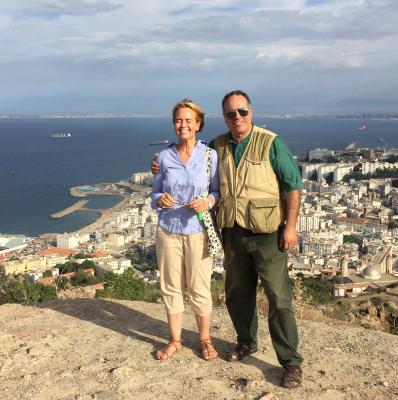Agony of Algeria's persecution of reporter Said Chitour

ROME — Eight months after the respected Algerian reporter Said Chitour was jailed on trumped up charges of ‘espionage,’ the Algerian military authorities have failed to clarify the Kaskaesque allegations and his lawyers say that no immediate end to his plight is in sight.
“Said has become a bit calmer and more resigned to his fate since he began teaching English to the other prison inmates but it is a desperate situation,” said a friend who has been in touch with Said’s family. “His wife Luiza is concentrating on bring up their two kids who remain in the country.”
My friendship with Said goes back to the 1990s, when I was reporting in Algeria on the civil war between Islamists and the security forces for the London Times and the Sunday Times. Said worked for the Sunday TImes, looking after visiting reporters such as Jon Swain, and above all for the BBC, as well as France 24 and the Washington Post, while more recently he even shepherded the revered English classical scholar Mary Beard around Algeria to see the Roman ruins.
Said and I remained in touch over the last decade even though Algerian authorities refused repeatedly to issue me with visas to visit the country after the publication in 2008 by Yale University Press of my book, co-authored with academic Martin Evans, Algeria Anger of the Dispossessed, https://www.amazon.co.uk/Algeria-Anger-Dispossessed-John-Phillips/dp/0300108818 in which we explored the alleged role of the military in the massacres at Bentalha and other towns of the ‘triangle of death’ in the Mitidja plain, a terrible slaughter of thousands of civilians blamed on Islamist terrorists that still can not openly be discussed in Algeria under the censorship maintained by the Bouteflika regime.
Said himself never adhered to the conspiracy theories about the political violence in his homeland. “Can you imagine what terrible things foreign journalists write about my homeland?” he said, head in his hands, as a group of foreign reporters gathered in 1996 at the St. George hotel where once Eisenhower had his headquarters.
More recently I had no hesitation in recommending Said to take care of another friend and author, Michael Mewshaw, who intrepidly visited Algeria for his travel book about North Africa. Michael insisted in getting close to the heart of the mystery of the kidnapping and murder of seven French Cistercian monks at the monastery of Tibhirine, traveling with Said to the strife-torn city of Medea where I had been allowed to visit after the abduction of the holy men only under heavy escort by the Algerian gendarmerie.
Subsequently as I was poised to pay for our book to be translated into French after finding an Algerian publisher interested in printing it, Said advised me not to waste the money.
His sources in the DRS, the military secret service that is the ultimate power in Algeria, were angry over what we had written and would never allow it to be published in Algeria, Said told me.
Now apparently Said’s lawyers disagree on how to proceed – one thinks they should fight the case in the criminal court whereas Brahimi – the human rights lawyer – thinks cassation is the best way forward which involves an appeal to Supreme Court. But the process could take anything from one to five years.
Reporters without Borders has launched a petition for Said's release https://rsf.org/en/free-said-chitour
When Arab states choose to persecute a local journalist who has worked with foreign media it is inevitably intended as a harsh message to the western media not to try and get to the truth of what is happening in the country.
It is also often a way to put pressure or seek dialogue with the host country of the foreign media, in this case the UK.
Algeria has shown itself unfriendly to British media in other ways recently, refusing accreditation to a German reporter for the British news agency Reuter who applied to be allowed to re-open the Reuter bureau in Algiers. Britain has considerable interests in Algeria through investment by BP and other energy concerns.
Whatever Algeria’s current axe to grind with Britain may be, it is to be hoped that the new British Ambassador in Algeria will use his influence to help end the unjust incarceration of a brave reporter who always took issue with anyone being negative about his beautiful homeland.
jp


